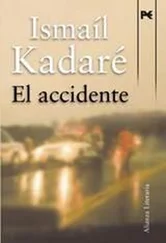“When I came back you were in a trance,” said Rovena. “I expected you to ask me what it was like.”
“I don’t know what was stopping me,” he said. “Maybe I thought you wouldn’t be able to tell the truth even if you wanted to.”
“Perhaps,” she replied. “Sometimes that really does happen.”
He took a deep breath.
“It’s what usually happens. And it is a really peculiar thing that love, the most beautiful emotion on earth, is the one least able to bear the truth.”
“I don’t know what to say,” she said.
“It’s different now. You’re free now. We’re both different now. Do you see what I mean? We’re both entirely different, so now you can say it.”
She remained silent, but she took his hand that was stroking her stomach into her own, and guided it where she wanted.
“Do you really want to know?” she said in a lifeless voice. Did he really want to know, after so long? The words of both of them, broken by their laboured breathing, died out into silence.
“Now I understand why you gave me the Cervantes text,” said Rovena when they were calm again.
He had not worked it out so precisely, he said. He had been drawn to the text first out of curiosity and its resemblance to the Loreley. The other things came later.
“You told me the text contained a mystery, and that you had found the key to its meaning.”
“I don’t think I’m the only one. Would you like to hear about it? Aren’t you tired?”
“Don’t back out,” she said. “You told me that the hour after midnight would be the same as it has always been.”
“That’s true. I promised.”
She took a deep breath.
“The hour when a prostitute tells her interested client about her orphaned childhood, drunken father, insane mother.”
“That’s enough,” he interrupted, clapping his hand over her mouth. He felt her lips under his palm, gently squeezed into a kiss, and his heart leaped.
That same night. The occult text.
Slowly he began to explain his interpretation of the text. Rarely had such a great deception been portrayed in such a covert manner. Treachery triumphed. All the characters were waiting their turn to deceive or be deceived. Camilla, the young bride, is first deceived by Anselmo, her own husband who puts her to the test, and then by Lothario, their house guest, who agrees to play the game. Then Lothario, now Camilla’s lover, deceives her again by failing to confess to her how the story started.
Anselmo, with his mania for putting his wife to the test, is deceived by both Camilla and Lothario, who become lovers behind his back.
Truth is violated to such an extent that when Lothario acts honestly he is vilified for treachery, and when he becomes a deceiver he is revered as a saint. The same goes for Camilla. First she is suspected of being inconstant when she is not, and then she is praised for her sanctity when she yields.
“The only character in the story who deceives without being deceived is Lothario. Do you agree with that?”
Rovena did not know what to say.
“Or so it seems,” continued Besfort. “But probably the opposite is true. In all likelihood, he is the only one who is a victim of deceit.”
He went on to explain that the most mysterious passage in the tale describes the morning before dawn when Lothario sees a stranger coming out of Anselmo’s house. Lothario jumps to the conclusion that Camilla has a lover. Did she find him herself? Or did Anselmo plant him there, to repeat his test? Curiously, Cervantes suggests only the first possibility. He does not raise the second at all, although it is just as likely, if not more so.
Any careful reader must ask a serious question. What is Lothario doing outside Anselmo’s house before dawn? Why is he on the lookout? What does he suspect?
This question turns the entire text inside out, and here is the new interpretation.
Anselmo and Camilla, after they are engaged or married, discover the miracle of sex. Their passion for each other is such that they turn the marital bed, so often derided as a desert of tedium, into an altar to the boundlessness of desire. With the passage of time their lusts become ever more refined, pushing them towards an ultimate liberation. They try every kind of sex they have ever heard of or imagined. They talk dirty, they perform the most shameful acts. They know no limits. As they eat dinner with friends and go to market or Sunday mass, they think of nothing but the hour after dinner, when she comes with a candle in her hand to the bed where he is waiting for her, his desire hotter than the melting wax. In sombre, mighty Spain, bristling with cathedrals, with its protocols of the Inquisition and its spies, these two are set apart. They discover a kind of passion that few have ever known, which transports them every night to unknown regions. The barriers of shame fall one after another, and the couple break through inhibitions and taboos, until one day they stand before the gateway of decision. “Would you like to try it with someone else?” A long silence. Then the answer, “Why not?” And then the question, “What about you?” and silence again. And then the reply, “To tell the truth, yes.”
And so, trembling with terror and lust, they embark on the great trial. Everything about it is unnerving. Especially the selection of their partner and victim. First they suggest Lothario, but they both reject this choice as too reckless. He is too close a friend. They think of others, but they are no good either. The first is bald, the second has some other flaw, the third isn’t serious and the fourth not man enough. Camilla notices with delight that her husband is not deviously choosing someone lesser than himself. This makes it easier for them to come back to Lothario. Camilla says candidly that he fits the bill. Anselmo makes no objection. He suits them both. In short, he excites them both.
And so events take their course. But the difference is that Anselmo never leaves the house. Excitedly, he watches Camilla making herself ready for another man. He senses her impatience, which matches his own. Then, from the place where he hides, with Camilla’s knowledge, he observes everything: Lothario’s declaration of love, Camilla’s bowed head. He watches them draw close and kiss for the first time. Then from another vantage point he watches them go to the bed and undress. He hears Camilla’s familiar cry, and sees her pale legs carelessly splayed after their lovemaking. He can hardly wait for the other man to leave, so that he can make love to his wife.
And so it goes on for several weeks, or perhaps months, until the day of the catastrophe. There is no doubt that a disaster occurs, and it is entirely credible that Lothario, now in the role of eavesdropper, should see someone leaving the house in secret. What is not credible in the story as Cervantes tells it is the introduction of the servant girl’s love affair, and so on. In fact, it is not the servant girl’s lover leaving the house, but Camilla’s.
And this is what the new reading tells us really happened:
Camilla and Anselmo quickly tire of Lothario, and want to stretch their limits again. As is usual in such cases, they want fresh stimulus. And so they need a new partner, as Anselmo had predicted they would from the start.
Lothario has noticed something odd. His suspicions have been aroused. That is why he spies on his friend’s house every night until he discovers the truth.
Here the curtain falls on the drama and we are left in darkness. Something serious happens, something that brings death to all three, but for some reason this is not revealed.
Besfort was tired, and he fell silent. As so often when he spoke again after an interval, his eyelids moved first.
Читать дальше












